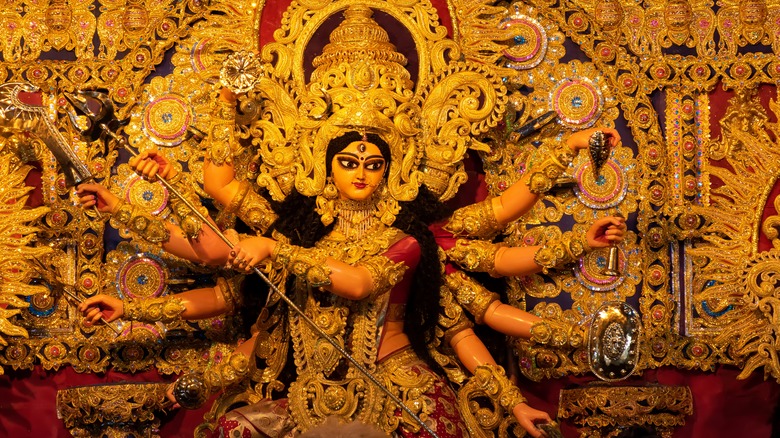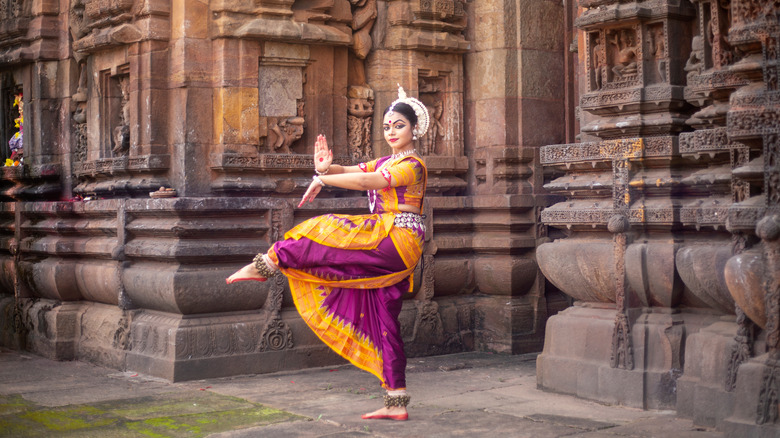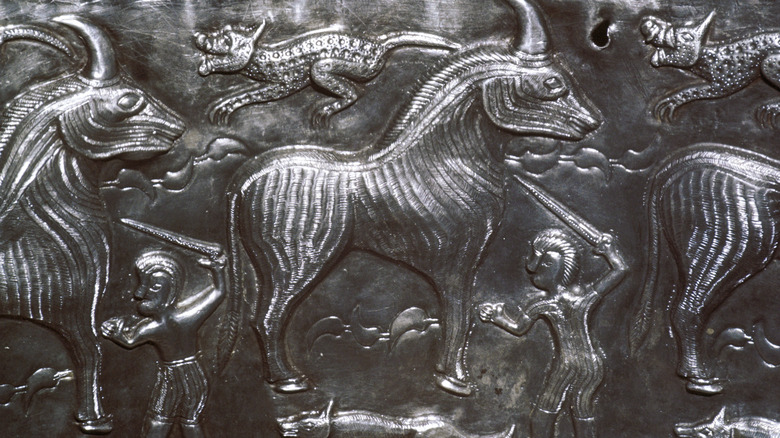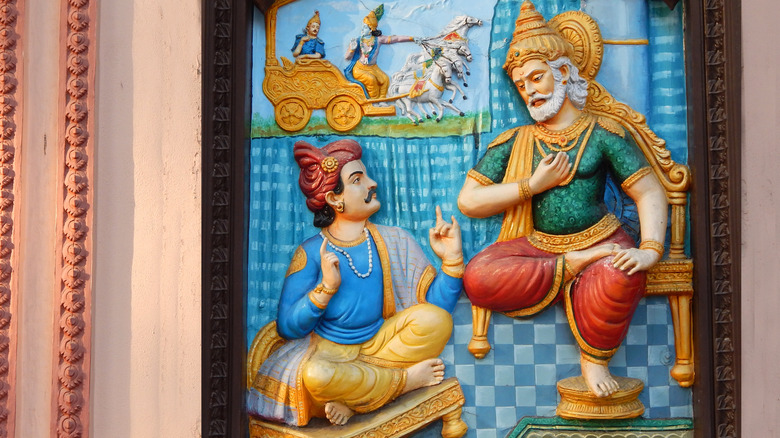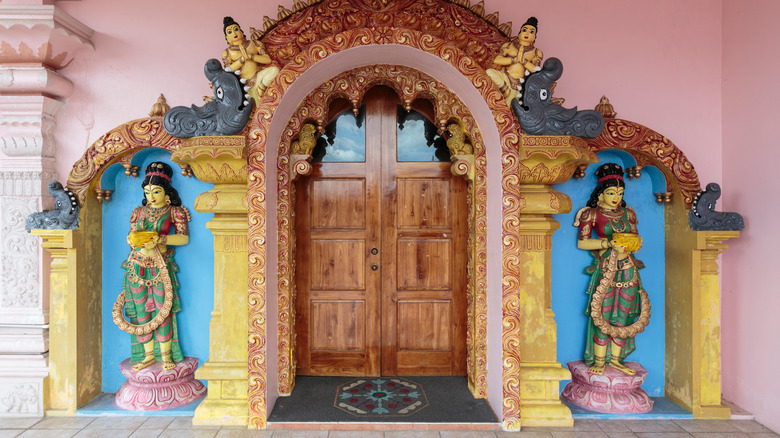Hinduism Is Older Than You Think
In Western countries, Hinduism could well be the most mysterious major religion. It shouldn't be: About 1 billion people worldwide, including 80 percent of India, call themselves Hindus (per Britannica). Hinduism's literary legacy is equally immense, almost too big to read in one lifetime; some of these, like Bhagavad Gita, appear in bookstores and are quoted in speeches everywhere. ("I am become Death, destroyer of worlds, devourer of men," were the words Robert Oppenheimer was said to have recited after seeing the first atomic explosion. In fact, he never did.) Yoga has Hindu origins and is still a form of Hindu worship. Even Buddhism emerged among Hindus and retains a number of Hindu preoccupations, like karma and reincarnation.
Part of the mystery surrounding Hinduism is its lack of a central dogma. It is, as the Hindu American puts it, a pluralistic religion; it doesn't seek converts or ban heretics. It never needed to. It is the world's oldest living faith. Five thousand years of history are alive inside it.
What is Hinduism?
Hinduism can be hard to explain. The British writer C.S. Lewis once categorized religions like soup as either "thick" or "thin." "Thick" religions, Lewis said, are concerned with lavish rituals — singing, artwork, mystery rites, even moments of ecstasy. "Thin" religions are more concerned with ideas like abstract good and evil or the nature of the universe (via Crisis Magazine).
Hinduism is both thick and thin. As Britannica explains, it varies from region to region in South Asia, so the god worshipped in Punjab may have a different name — or be depicted differently in art — than the same god in West Bengal. The core of Hinduism, ironically, is a kind of monotheism. As Hindu American details, Hindus everywhere refer to the one universal God as Brahman, although different schools interpret His nature differently. In any case, Brahman takes the form of various lesser gods, like Shiva and Vishnu, to aid human comprehension of Him.
The other key to Hinduism is a concept known as dharma, which is a web of duties, obligations, beliefs, and ideals of divine origin. The division of Hindus into hereditary castes is a matter of dharma, as are sex roles, specific prayers, and the belief that a soul will be reborn after death according to its sins or virtues in life.
From the childhood of India
It has taken thousands of years of accumulating ideas for Hinduism to reach its present form. The earliest we can trace these beliefs, according to Britannica, is to about 3000 B.C., when an advanced civilization sprang up in the Indus river valley. Very little is known about this early childhood in India.
Around 1500 B.C. — about five centuries before the earliest books of the Hebrew Bible were written — mounted tribes from Western Asia invaded India, bringing their Sanskrit language and a pantheon of new gods, like Agni and Indra. This was the Vedic religion, which was named so because the hymns, ritual instructions, and poems that the invaders recited were compiled into books called the Vedas. This was still not modern Hinduism, but it shaped the future faith; to this day, boys of the Brahmin class (like the one shown above) are instructed in the Vedas.
Two things happened as the Vedic religion settled in the subcontinent. The Vedic religion began to blend with local customs, and imported gods like Indra lost importance or were identified with local gods; and priests began to build on the mysterious poetry of the Vedas, addressing metaphysics and moral philosophy. This new synthesis was written down sometime after 700 B.C. in the complex books of the Upanishads.
A European cousin
The people who brought the Vedic religion to India were Indo-Europeans. They belonged to an ethnic and linguistic web of populations that may have originated on the steppes of Western Asia (via Classic History). These wanderers, who rode horses and sang epic poems, became the modern Celtic, Latin, Germanic, Iranian, Greek, Armenian, and Indian (formerly called Indo-Aryan) peoples. As different as these people became in custom and appearance, they shared certain lingering traits. Many of these appear in the Vedas and later Hindu poetry. "Ramayana" and "Mahabharata" are remarkably like Homer's "Iliad," with their endless battling heroes and meddling gods; Ramayana is about the abduction of a woman, like the "Iliad" (per Harvard).
The grim Vedic ritual of aśvamedha, or horse sacrifice, is another key link. As Oxford Reference explains, the Vedas prescribe that a king sacrifice a magnificent stallion, after which his wife should simulate sex with the animal's body and finally cook its meat and distribute it among the nobility. Pope Gregory II pushed the idea that horse meat was a sacred taboo in ancient Germany; the Romans sacrificed race horses (per The Colchester Archaeologist); and the medieval historian Gerald of Wales reported that Irish kings would, at their coronation, have sex with a white mare before slaughtering it and boiling its flesh. He would then sit in the cauldron and ladle the broth into the bowls of his barons (via York University).
The name Hindu
Interestingly, Hindus only recently started calling themselves Hindus. Britannica explains that the word "Hinduism" is, in fact, an English name. A Victorian Sanskrit scholar at Oxford University gave Hinduism its name, derived from the Greek word (related to "India," "Indus," and "Sindh") for India (via World History Encyclopedia)
Previously, the worshippers of Shiva, Vishnu, Shakti, and the rest of the post-Vedic pantheon were more likely to identify themselves by which school of thought they belonged to. By the 1500s, the Mughal invasion from Central Asia made the word "Hindu" useful to distinguish the natives from the Muslim invaders (via Business Standard). After the introduction of the word Hinduism by the British academic establishment, some Indians embraced it as a useful, all-encompassing name for their religion. Others preferred their own names: "sanatana dharma" was a common one, meaning universal law. Others called their faith the "Vedic religion," despite the differences between their own practices and those of the ancient Vedas.
Hinduism in the world today
Whatever you call it, Hinduism has thrived in modern times. Part of this is due to its flexibility and pragmatism. When Buddhism emerged among Hindus of northern India, many Hindus adopted the Buddha as an avatar, or manifestation, of the god Vishnu.
Hinduism's relationship with Islam has not been as easy. Unlike Hinduism, Islam seeks converts; and even centuries after the Muslim Mughal Empire fell, many Hindus felt that the Mughals had imposed a foreign religion on them, one that forced them to give up their most ancient traditions. Many Muslims, in turn, felt threatened by Hindu hostility. Shortly after India won its independence from Britain, a Muslim breakaway state called Pakistan declared its own independence from India. Tensions are still high, particularly as India's ruling BJP party encourages Islamophobia (per The Diplomat).
Muslims still make up about 15% of India's population, compared to Hindu's 80%, but the number of Hindus is increasing at a much faster rate, as Pew Research Center makes clear. Hinduism is also practiced abroad: Many of V.S. Naipaul's novels, like "A House for Mr Biswas," concern Hindus on the Caribbean island of Trinidad. The world's oldest faith shows no sign of slowing down.
